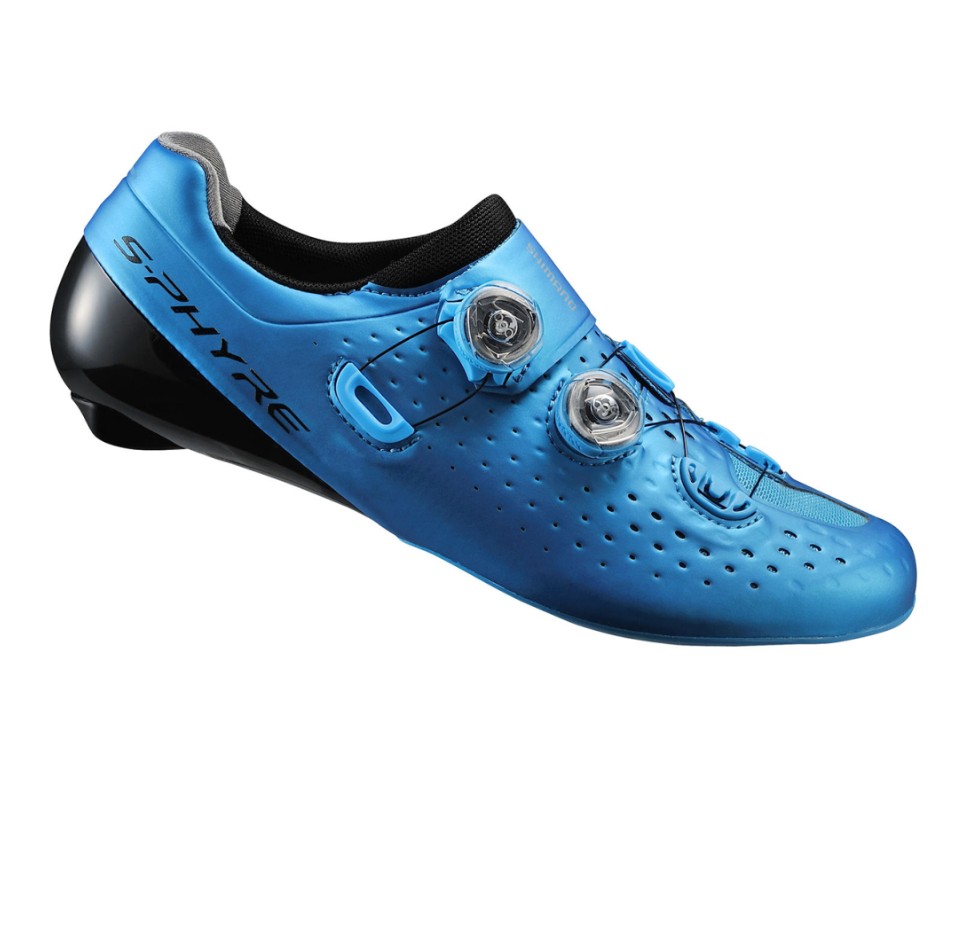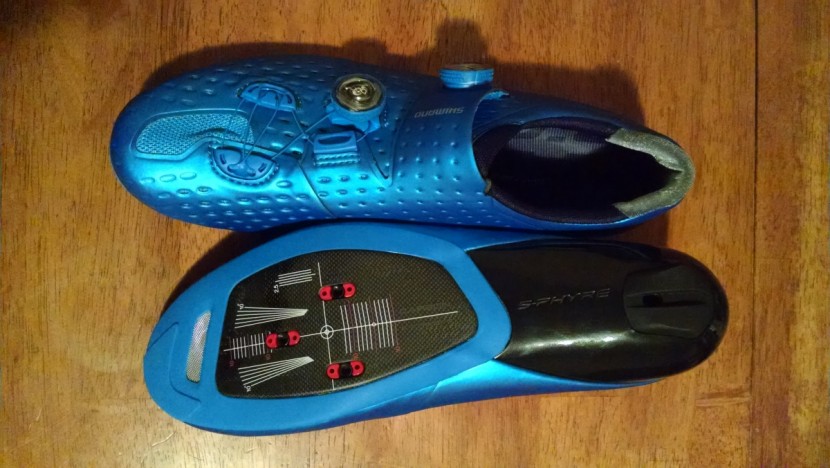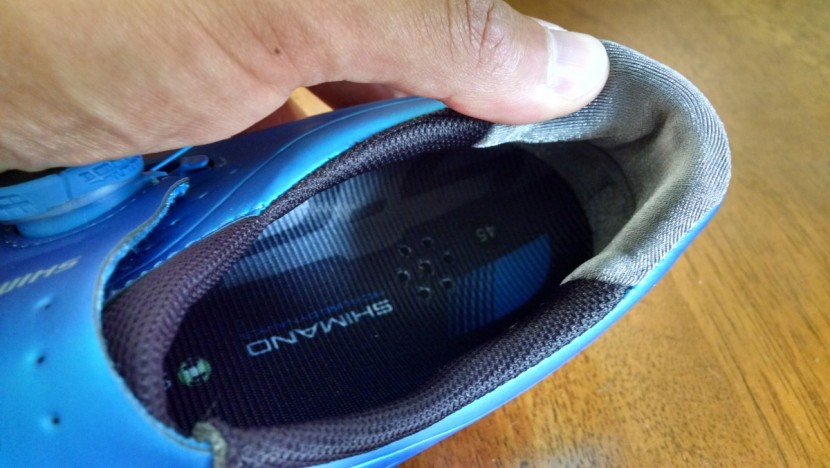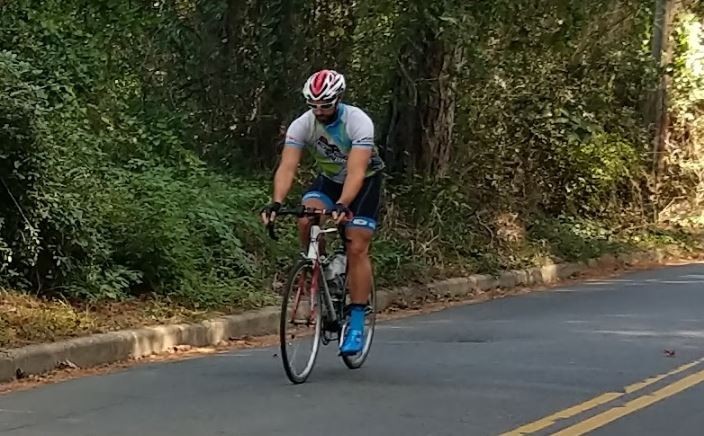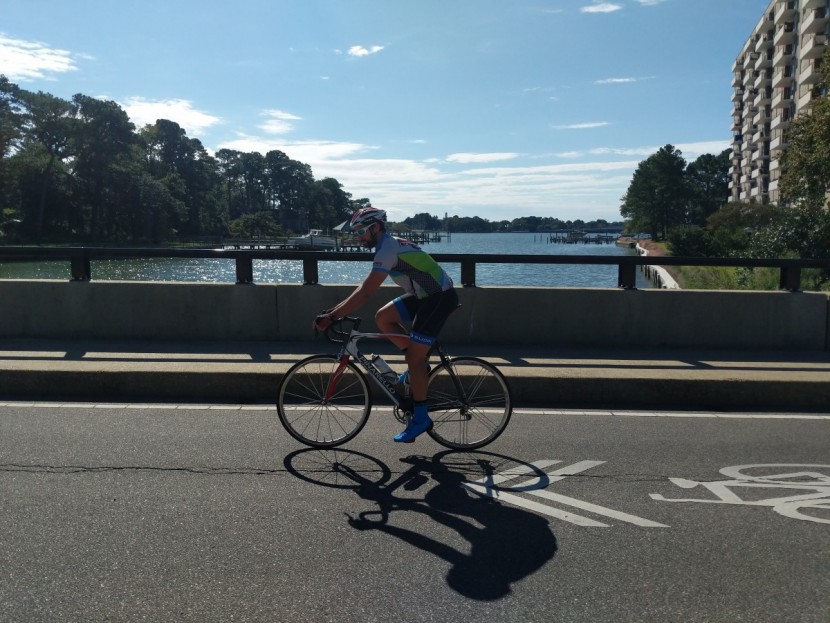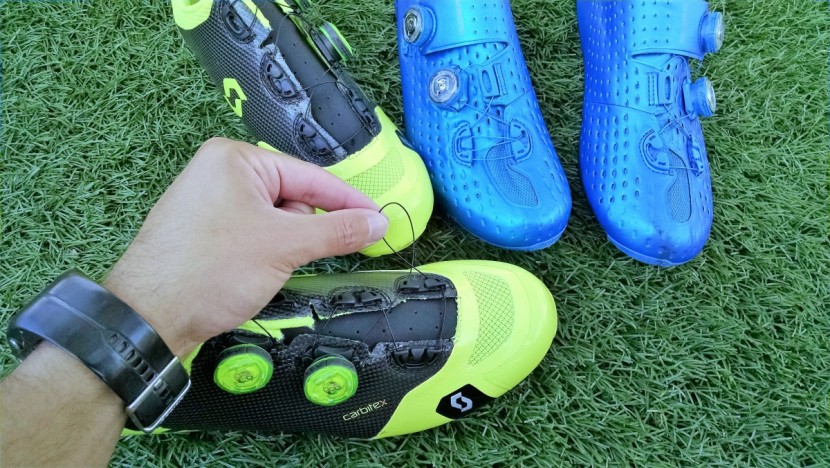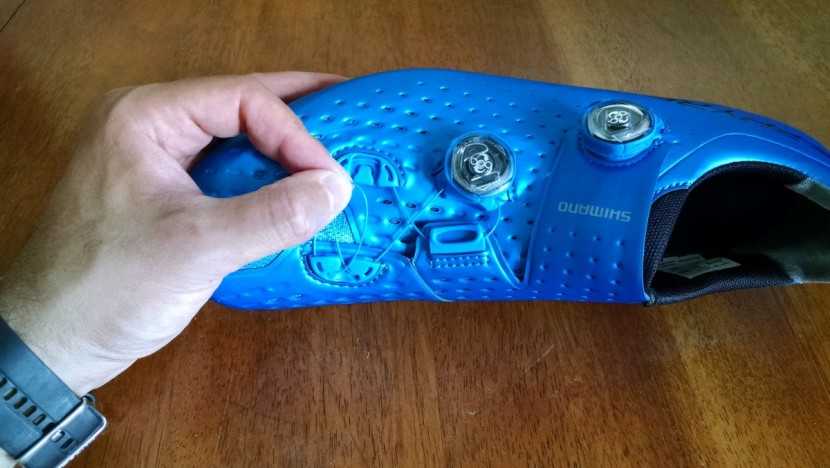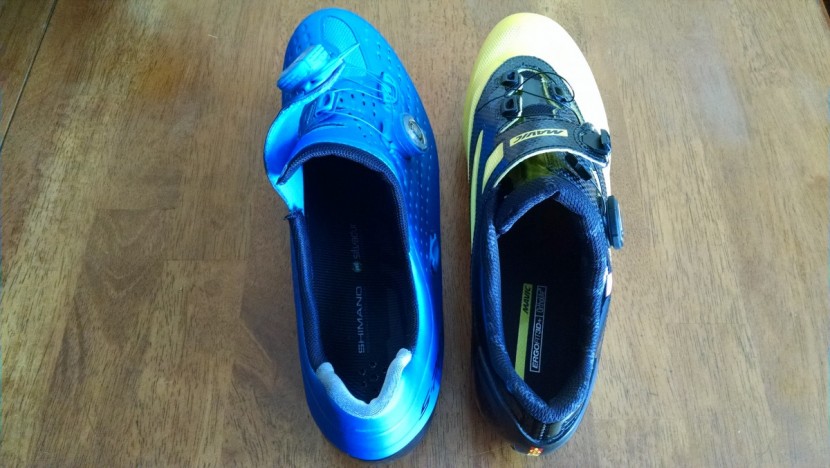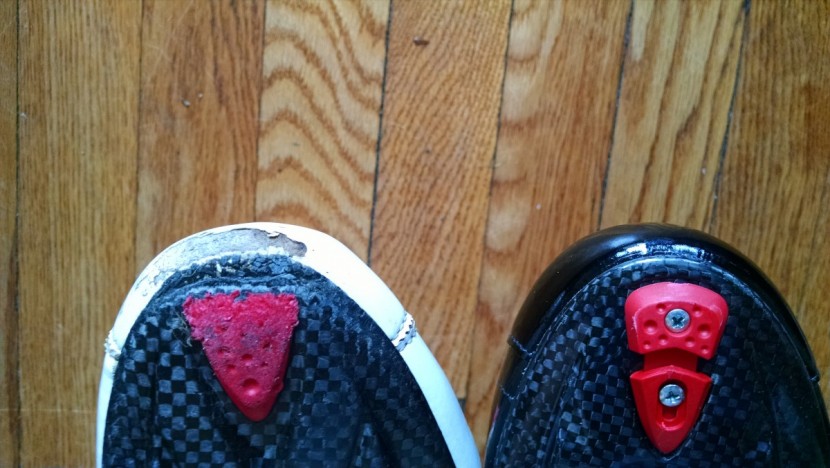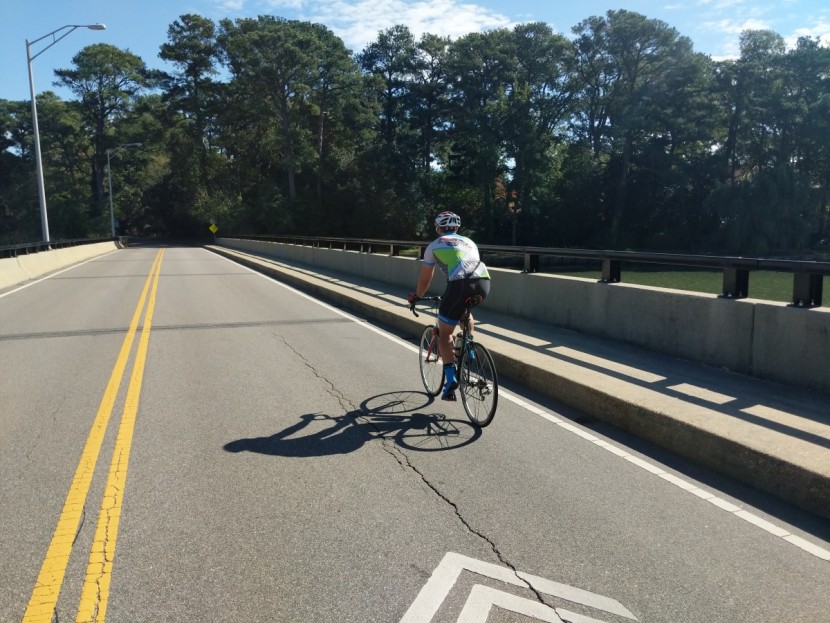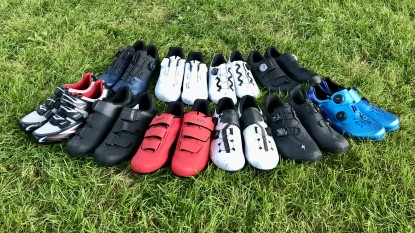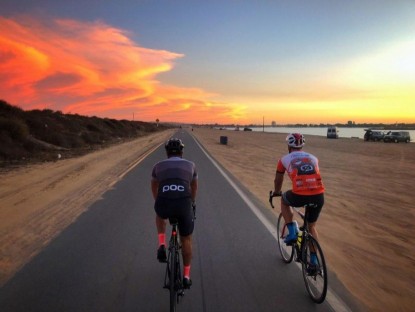Shimano graced this shoe with some updates since our testing period, which you can read about below.
September 2019Shimano S-Phyre RC9 Review
Our Verdict
Our Analysis and Test Results
Updated S-Phyre RC9
Since we last pedaled in this shoe, Shimano has released an updated, lighter weight version. The updated model includes enhancements to the hydrophobic materials and has a redesigned heel cup with an external curve intended to provide foot stabilization and better power transfer. The update also comes with an increased amount of smaller perforations for more ventilation. Compare the updated shoe (left) to the first generation we tested (right)
We're now linking to this second generation shoe, but as we've yet to test it out, the review from here on speaks to our experience with the previous incarnation.
Hands-On Review of the S-Phyre RC9
We were initially skeptical of these because their design seemed gimmicky, and we were especially concerned that the wide, low topline would allow the heel to slip as in other models with wide openings. That was allayed once we cranked the top dial down a bit and found a good seal, aided by the cat-tongue wire material lining the inner heel. They were easily one of the best shoes we had ever worn, and they kept that exceptional performance across the miles. You will be hard-pressed to find a more comfortable, stiff, lightweight shoe at their price, and that is what earned them the Top Pick Award, though they still come at a slight premium. They outperformed in most of our measures and very much deserve their place in the pro peloton, but of course, they're not perfect. Read on to see how they do next to the rest of our lineup to see if they're the right fit for you.
The S-Phyres dominated much of the field, always near the top of the ranks. It's no wonder they won our Top Pick Award.
Comfort
Shimano has hit the sweet spot with this incredible shoe. One of the toughest things to do with a high-end racing shoe is to prevent hot spots and rubbing without compromising lightness, rigidity, and power transfer. To achieve that, they used a single-piece Teijin Avail microfiber synthetic leather upper with the burrito tongue design that firmly wraps the foot in padding.
These kicks round out the top of the measure next to the Louis Garneau Course Air Lite II, which won our Best Bang for the Buck Award. These include thick collar paddings, smooth sock liners, and malleable uppers that allow for a flexible, but firm embracing fit. What separates them is flex and hug in the upper. The LGs use a form-fitting design with a supple Microfiber upper as well as a special expansion zone near the outside of the upper foot to allow the foot to expand with pedal strokes. The S-Phyres offer a uniform tightening and narrower rim that grasps heel and top of the foot to make a stable, comfortable stroke. If you prefer a stiff ride, the Shimanos would be the better choice. If you want similar performance to the S-Phyres, but are looking for a lower sticker price, take a look at the Course Air Lite IIs.
As previously mentioned, part of what makes the Shimanos so great is their tongue design. The only other model to use the burrito tongue design was the Mavic Cosmic Ultimate II, which also had a stiff carbon upper that made the shoe a little more challenging to put on and take off and created more hot spots. Shimano's more malleable and forgiving upper allows the foot to more easily slide in and out and to adjust tightness enough for the fit you want instead of the single fit provided by the rigid carbon shell of the Cosmics.
This model tops it off with a super smooth sock liner and a cat-tongue heel that's smooth on the way in, but grips the heel on the way out to hold the foot in place and prevent slippage. So many good shoes lose it on the heel where constant slip causes rub blisters and discomfort, but they developed a clever solution here.
Weight
As with most things in cycling, as the price and prestige of an item increase, weight typically decreases. Or to put it more accurately, you will pay more for lighter gear, and you can blame the weight weenies. That being said, these kicks come in at an incredible 19 ounces a pair in men's 45. To put that in perspective, each shoe weighs about as much as a hampster (okay, so it was a pretty specious perspective).
Topping the chart is the Scott Road RC SL at just 18.4 ounces in a men's 44, just ahead of the Best Bang for the Buck Louis Garneau Course Air Lite II at 18.7 ounces. Following that was the Giro Empire ACC, coming in at just 18.8 ounces in a men's 44. All of the shoes we tested were in 44 except the Shimanos, which we ordered a size larger to avoid concerns about the model running small after finding reports to that effect. A 44 would have certainly put them up at the top of the list. When it comes to weight, you don't have to be a weight weenie to see the value in the RC9s over the others listed here.
Power Transfer
When it comes to power transfer, it's important to have both sole rigidity and a stiff upper that minimizes excess movement (read: lost energy). To achieve sole rigidity, they use a slimmed-down carbon fiber outsole that skips the lasting board, bringing the foot closer to the pedal and reducing the destabilization that can occur with taller stacks. To achieve upper responsiveness, they use a snug burrito wrap and a single-piece Teijin Avail microfiber synthetic leather that offers a secure, close-fit, amplified by the superb dual IP1 Boa dial system that brings a uniform lock across the foot. They also use a rigid external heel cup to reduce instability.
These come in right near the top of our ranking but are just slightly outdone by the Scotts and the Sidis, which both offer top of the line rigidity and upper stiffness. The Sidis' heel closure system and narrow opening help reduce heel movement to a higher degree than their competitors while the Scotts use a premium HMX carbon sole and a stiff Carbitex upper for excellent transfer. Any roadie looking for an immovable ride should be looking for the top shoe here. For those who are looking for a little more comfort and a little lower price will be happy with the Shimanos.
Adjustability
These kicks use a dual micro-adjustment lacing system provided by two independent, bi-directional, pop-release Boa IP1 dials and eyelets staggered across the upper to limit torsion, making adjustment more effective - it's no good if you can tighten a shoe down until your foot bleeds, but it doesn't improve performance. One of the unique features of their fastening system can be found in the lower eyelets where an optional anchor allows the fastening cable to be strung across the toes to give a tighter fit and does increase the range of tightness and on-the-fly adjustment.
This is another measure where the Sidis just barely beat them out for the top spot, primarily based on their adjustable heel retention system, which presents a significant advantage over of the RC9s, which still experience a degree of heel slippage. The Sidis are slightly more challenging to get a handle on mid-ride, but they can be dialed in a little more. Alongside them are the Scott Road RC SLs, which use almost the same Boa configuration, including an extra cleat on the toe anchor.
The real difference between them is that the Scotts have a rigid Carbitex upper that's more difficult to adjust simply because it's nearly immovable, while the Shimano upper is a malleable synthetic leather that hugs your foot. Next down are the award-winning Fi'zi:ks, which feature an upper that responds well to tightening and loosening and a bi-directional, pop-release Boa dial along the upper portion of the shoe and a toe strap.
Riders looking for the most locked-in feel possible will find solace in the premium Sidis, but it would be shocking if they didn't get what they needed from the Shimanos.
Durability
These shoes should last quite a while with minimal degradation. They use a strong synthetic leather, Teijin Avail, for their upper, and also use a tough plastic to cover the outsole and heel. Their carbon outsole increases their durability over many of the lower-tier composite soles. They also have a replaceable heel pad, but on that note, we were concerned about their toe pad, which is not a replacement. The wear it endures will be permanent, not to mention the lack of raised pad leaves the toe of the upper vulnerable to degradation.
Coming in a little ahead of them are the Lake CX237 and Mavic Cosmic Ultimate II, both of which use tougher, longer-lasting, but less comfortable uppers. The Lakes use a high-quality full-grain leather, often considered to be the most durable form of leather. However, that toughness comes with the drawback of being boxy and a little coarse on foot. Likewise, the Mavics use carbon fiber in their upper for a super sturdy shoe, but it also feels like putting your foot into a hard box, as one might expect.
Once again, topping this measure are the Editors' Choice Fi'zi:k Infinito R1 and Sidi Wire Vent Carbon, which both also use a full carbon sole. The Sidis balance toughness and comfort in the upper using a synthetic microfiber called TECHPRO, which provides longevity and doesn't have the hard boxy feel of the full-grain leather or carbon fiber. It also has replaceable pads for both the heel and toe, increasing the longevity of the sole and upper.
The Scotts also go a long way to lasting forever. Their Carbitex upper is incredibly strong. The material itself is nearly impervious to damage, at least compared to leather and most fabrics. The actual design of the shoe also goes a long way to limiting exposed areas and cutting down on vulnerable seams. Riders will be hard-pressed to hurt this shoe.
When it comes to durability and overall performance, we think riders ought to look at the Sidis and the Scotts. However, we think that even with their lower durability, the Shimanos deliver enough performance in other areas to outshine the Lake and Mavic.
Best Applications
These come with three holes for SPD-SL, LOOK, and TIME cleats, but Shimano also sells adapter plates to easily convert to SPEEDPLAY. These are best suited to endurance road riding and are found in the major pro pelotons.
Value
We awarded these the Top Pick for Lightweight Racing Shoe because we felt that they deliver as much as any rider could want, and they do it at a price easily 20% lower than premium pro shoes.
Conclusion
Hands down, these are among the best shoes we've ever worn. They deliver optimum style, adjustability, longevity, power transfer, and they are incredibly comfortable. They are obviously on the upper end of fiscal accessibility, but for all they offer, we think they're a great deal. Any rider could put these on and rightly feel like a pro, though the pro training is up to them once they're riding these.


